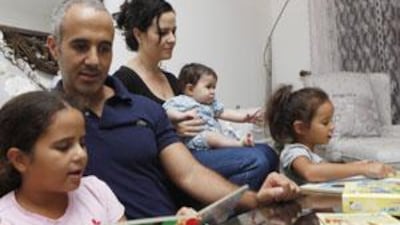DUBAI // Can Arabic books compete with Harry Potter? Can Arabic TV shows ever attain the production excellence of CSI? Will an Arabic filmmaker get anywhere near a Robin Hood, never mind an Avatar?
The lack of high-quality Arabic content in books and on screen is, in the view of many parents and observers, as much to blame for the decline of the Arabic language as the traditional culprits - foreign nannies, parental indifference, the prevalence of expatriates - and they hope that if the cultural sectors can catch up with the times, they might reinvent and ultimately save the language itself.
It was a prevalent theme during last week's Arab Media Forum in Dubai. The head of the Egyptian Radio and Television Union, Usama Al Sheikh, said quality was more important than quantity. "We should not be proud of having more than 600 satellite channels, yet the content is very weak, underdeveloped, repetitive, bossy, and vulnerable for invasion from foreign media." Ayman Badawi is a 39-year-old Palestinian who has an eight-year-old son, Omar. "Kids these days are so media-literate thanks to the internet and TV," he said. "Unfortunately the majority of Arabic shows and films don't compare to the foreign language ones which are so accessible, and because we do not invest enough, the final product is very poor."
Cinema screens make his point. Between May 13 and May 19, Grand Cinemas across the UAE screened one Arabic film, Adrynaline. During that period, CineStar, which has screens at Marina Mall in Abu Dhabi and Mall of the Emirates in Dubai, was showing Adrynaline and the multilingual City of Life. "Broadcasters and filmmakers across the Middle East have a dilemma - do they make programmes in classical Arabic, which is old-fashioned, or do they make them in local dialects, which many cannot understand fully?" Mr Badawi asked.
Mr Badawi observed that parents could make a difference by enrolling their children in a school with a curriculum that creates a strong Arabic-language environment. Ghaith Sabbagh is a Jordanian with three daughters - Meryam, 10, Leila, 4, and Dina, four months. He insists that his children must not be allowed to lose their cultural identity. "At home I speak to them only in Arabic but find that they very often find it easier to answer in English," he said. "Dubai has so many dialects like Emirati, Egyptian and Lebanese, and on top of that, they get taught a very classical form of Arabic at school, which they find hard to reconcile with what they hear at home," the 39-year-old RTA employee and Dubai resident said.
"I do try to make sure they watch Arabic shows but the choice is limited and most programmes are not good enough. MBC3 and Spacetoon are good channels as they broadcast in Arabic, and Freej is a great cartoon, although I feel it is aimed more at adults," he said. Mohammed Harib, the Emirati director and writer of Freej, said a lack of sponsorship was the main reason his show took five years to see the light of day. "We do have a problem of funding and support, as media is at the mercy of advertisers and sponsors who decide what is to be produced," he said.
This has led to an over-reliance on dubbed programmes - but Mr Sabbagh said that might not necessarily be bad news. "My two girls like to watch Turkish soap operas, which are dubbed into a version of Arabic that's easy to understand, but I don't mind that they are not original," he said. "At least they will still improve their grasp of the language." He is more optimistic when it comes to Arabic-language books.
"In the past two years there has been a renaissance for original Arabic-language books, especially those coming out of Egypt which deal with social issues, politics and comedy." After years of uninspiring releases by government-backed publishing houses, up-and-coming, edgy writers are finally being given opportunity to showcase their talents, thanks to independent outlets like Mohamed Hashem's Merit Publishing in Cairo.
"It is early days, but it's a promising start," Mr Sabbagh said. @Email:akhaled@thenational.ae

